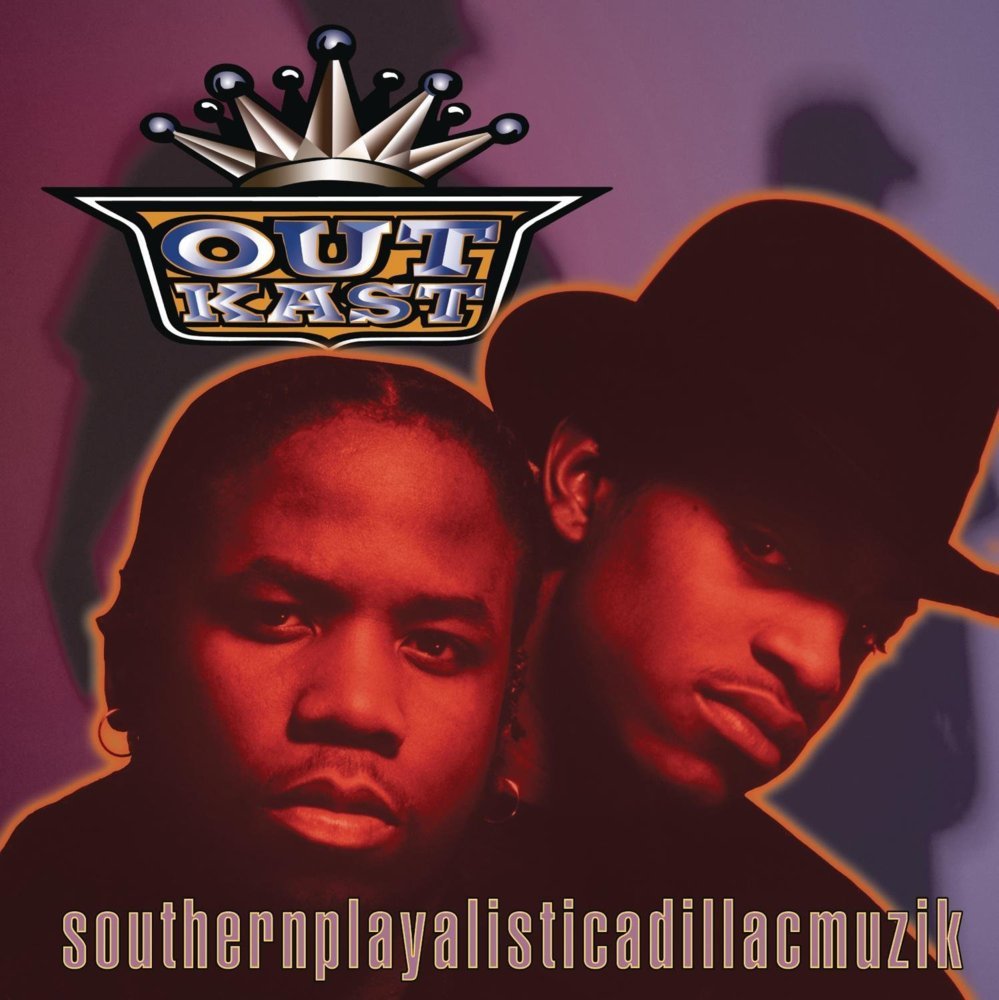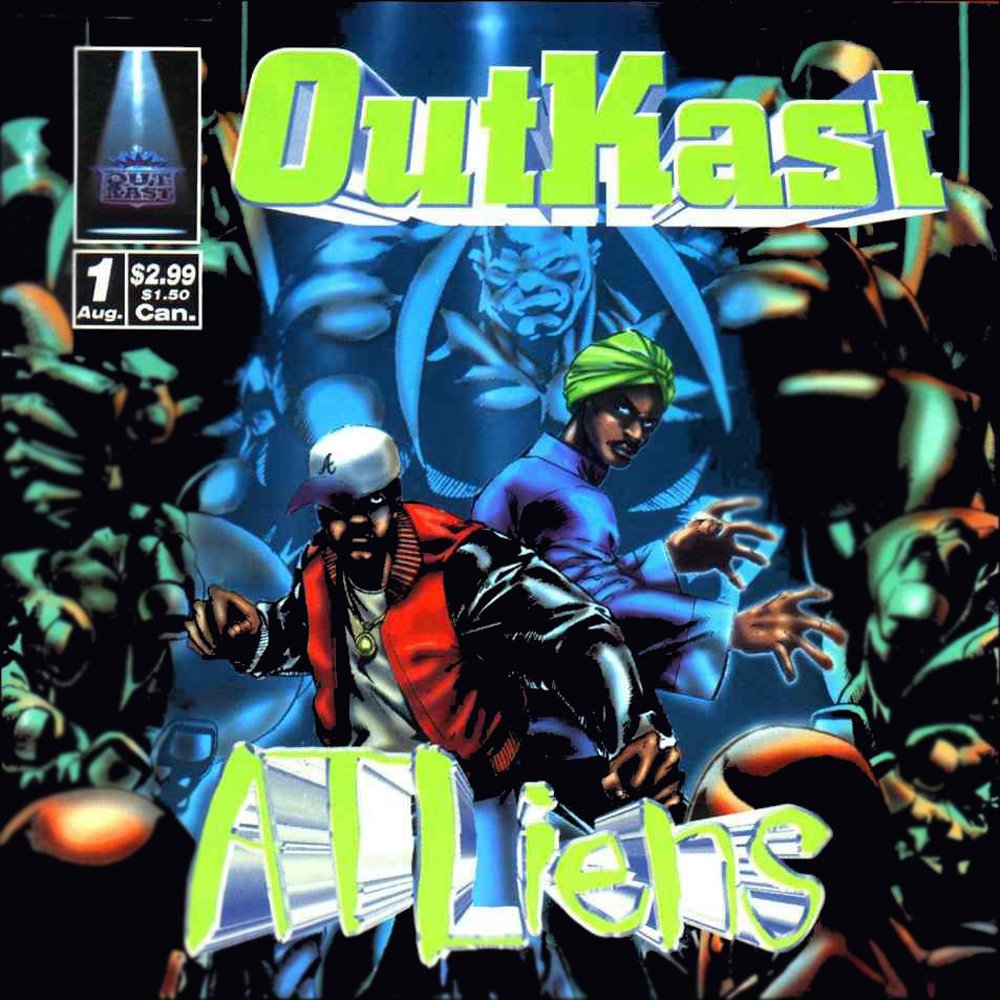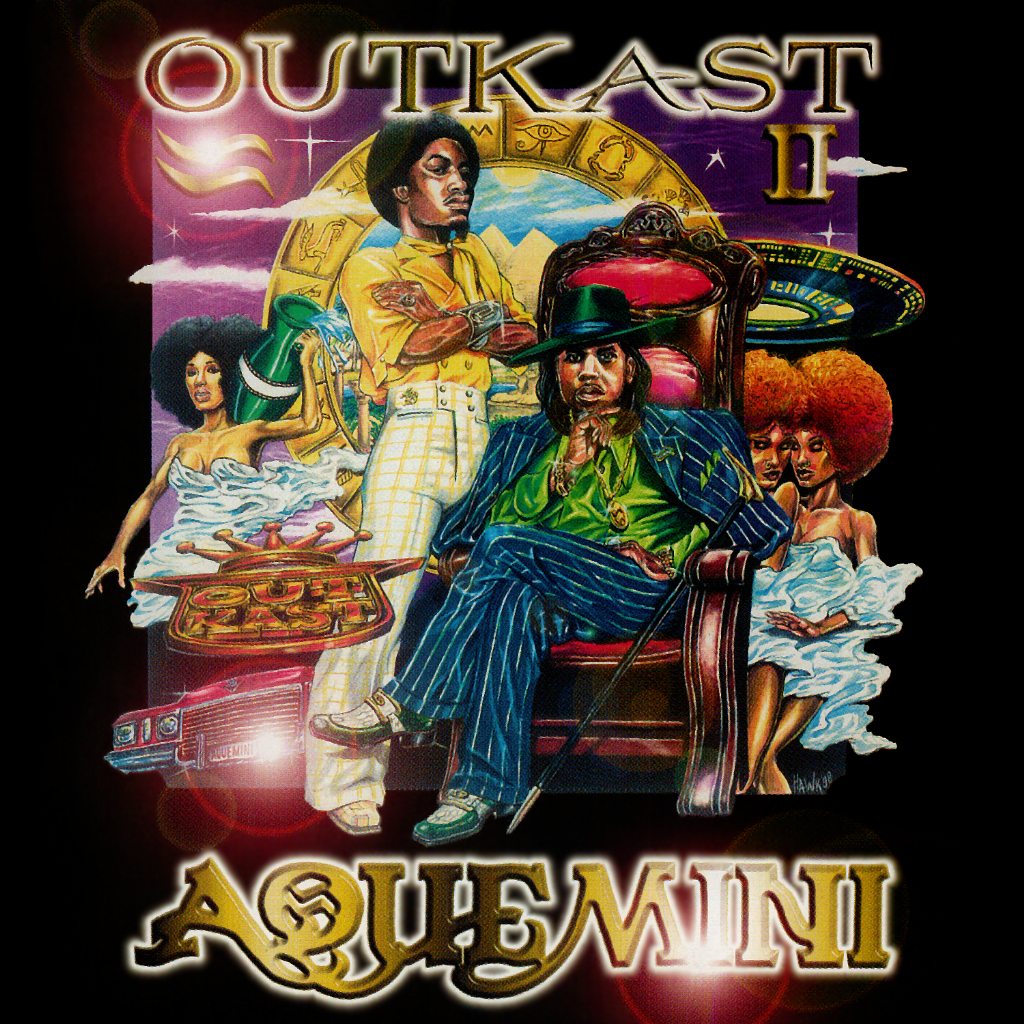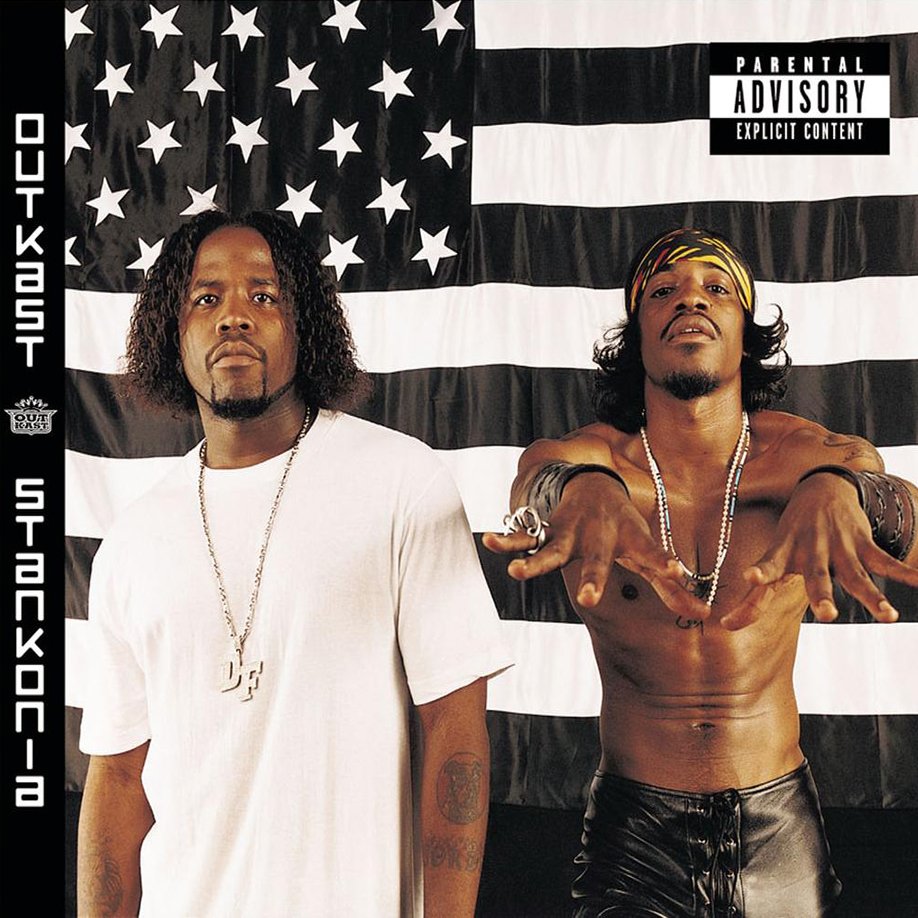Happy 20th Anniversary to OutKast’s fifth studio album Speakerboxxx/The Love Below, originally released September 23, 2003.
Was it inevitable? Had the course been set since their debut, nearly ten years earlier?
There had always been notable differences between André Benjamin (André 3000) and Antwan Patton (Big Boi) in their ascent to musical stardom. But OutKast were a duo that succeeded because of those differences, rather than despite them. A childhood friendship of two contrasting but complementary characters and artists meant their relationship stayed strong and stable in the early part of their career. And that relationship needed to be strong. Their 1994 debut album Southernplayalisticcadillacmuzik brought success, but the circumstances surrounding rap music at that time brought challenges.
At the Paramount Theater in New York on August 3rd, 1995, the Source Awards were held amidst an increasingly antagonistic chasm between the West coast and East coast rap scenes. Take a look at the Wikipedia page for that event and you will see the focus is firmly upon the cataclysmic chain of events that followed the bristling pointless machismo of the award show. That OutKast’s contribution isn’t detailed, speaks volumes about the emphasis put upon negative aspects surrounding rap music, rather than portraying a balanced or nuanced picture of the music.
Having been nominated for Newcomer of The Year, OutKast were announced winners and strode to the stage sandwiched between Suge Knight and Puff Daddy et al.’s chest-beating hubris. Seemingly dismayed by the overly simplistic East versus West bullshit, André 3000 accepted the award and uttered five words that shattered the polarization and opened up the conversation about rap music: “The South got something to say.”
And OutKast, let alone the whole of the South, did indeed have a lot to say. From Southernplayalistic…through ATLiens (1996), Aquemini (1998) and Stankonia (2000), their work became a sprawling, writhing concoction of rap filtered through P-Funk vibes, soulful notions and countless other influences. With an increasing avoidance of samples, they surprised and enriched rap music in countless ways. A year after ATLiens was released in 1996, they were interviewed for SPIN magazine and Big Boi opened up about their process. “We don’t listen to rap,” he confided. “I feel you cheat the listener when you sample. If it’s an old school jam, leave it to the old. We want to have our own school of music.”
Meanwhile in 1996, Billboard also interviewed the duo in the wake of ATLiens and André 3000 summed up his (by now crystal clear) attitude to his artistry, explaining, “I want my children to say ‘Daddy really said something; he wasn’t just trying to brag on himself.’’’
So, by the age of 21, they were both imbued with the maturity to see their path, the bravery to take the first step and the strength to continue along it, regardless of how others may have viewed their reticence to follow any template. Quite astonishing at such a young age.
Watch the Official Videos:
Yet after the huge success of Stankonia, André 3000 wanted something more or something different. He dabbled in acting, popping up in the odd TV show or film, but to no great effect or impact, so a return to music beckoned for him. In the meantime, Big Boi had been busy putting together what he imagined to be a solo album, before André 3000 also began the same process, albeit somewhat slower.
Management, though, didn’t take kindly to the thought of them releasing albums separately, but then inspiration struck with an idea seldom tried before—the two albums would be released together as flip sides of the same coin in the form of Speakerboxxx/The Love Below. OutKast, but not OutKast.
It is, of course, inevitable that the two records get compared and evaluated one against the other. For those who loved OutKast for their hip-hop mastery, André 3000’s The Love Below was a step in a direction that confounded despite the underlying desire to spread wings further that had always been present in OutKast’s work as a duo. Meanwhile others lauded André 3000’s flights of fancy and overlooked Big Boi’s monumental work on Speakerboxxx. The reality (to my ears at least) is that there is no way to bemoan either of the two albums if you ever enjoyed any of OutKast’s prior work.
That doesn’t mean however that I don’t have a favorite project of the two—it would be dishonest to suggest I love them equally—but both albums continue logical extensions of OutKast’s sound(s). Their award-winning debut was important for the reasons outlined above, but the trajectory after that is one of experimentation and the inclusion of an increasingly disparate and unconventional set of influences. Having already established their desire to avoid sampling, the fact that Big Boi has been a vocal and enthusiastic fan of Kate Bush gives an indication of their adventurous and bold natures.
Both members find ways to stretch themselves—Big Boi within the context of hip-hop, André 3000 with journeys into jazz, funk and soul—and the albums benefitted with both a rapturous critical reception and commercial success that saw them claim the #1 spot on the Billboard charts after three successive #2 albums. In its first week, it sold more than 510,000 copies and current estimates put it somewhere north of 11 million copies sold.
Part of the propulsion to success was the amazing impact of the first two singles. In “Hey Ya,” OutKast produced one of the greatest pop songs of the 21st Century and it sat at #1 on the Hot 100 for nine weeks, before being replaced by “The Way You Move”—one of only a handful of times an act has replaced itself at the top of the chart. In truth, I’ve never understood the success of “The Way You Move” (I think there are many better songs on Speakerboxxx), but “Hey Ya”, even here in the UK, punctured the public consciousness such was its incredible charisma and remarkable catchiness.
Limits on time and space preclude an in-depth analysis of all of the songs on the album, so the hardest job in writing this is choosing songs to highlight—such is the depth of quality across the two hours running time. “Ghetto Musick” is a barnstorming start to Big Boi’s album, with a similar tempo and feel to the redoubtable “B.O.B.” from Stankonia and the interspersing of the sample from Patti Labelle amongst the frenetic wordplay of Big Boi is a genius move. Other dynamite examples from Big Boi include the mid-tempo shuffle of “Unhappy,’ the loose funk of “Bowtie” and the blistering rock/rap of “Bust.”
There are two other things that stand out for me beyond the scope and vision of Big Boi. The first of these is the seamless way in which he is able to meld the drum machine patterns with the live bass and guitar. Donny Mathis’ funky guitar work on “Rooster” (and others) always hits the spot and Debra Killings’ bass work does exactly what her surname suggests. Secondly, bearing in mind the success of previous albums, the guest list is almost exclusively from the South. Jay-Z (who appears on “Flip Flop Rock”) aside, the other folks who show up for Big Boi are members of the Dungeon family and Killer Mike (pre-Run The Jewels fame). I’m sure most would have come running to feature on his album, but his desire to stay true to his roots and his peers is an admirable quality.
Enjoying this article? Click/tap on the album covers to explore more about OutKast:
I’ve tried very hard thus far to remain as impartial and sit on the fence as much as possible, but my conscience won’t allow me to finish without expressing my unabashed adoration for The Love Below. It has always felt like the kind of album Prince might have made if he’d been born in a slightly different time and space. It certainly bristles with a Princely funk—“Happy Valentines Day,” “Spread” and “She Lives In My Lap” share some of the same musical DNA and impish sense of fun as the Minneapolis maestro’s finest work.
The second half of André 3000’s album takes things in new and interesting directions too—there’s the weirdly enticing “Dracula’s Wedding” with Kelis, the delightful acoustic “Take Off Your Cool” with Norah Jones and the pulsing throb of “Love In War.” But to finish, I’d like to mention two moments that always register with me and send shivers of visceral enjoyment down my back whenever I listen.
The first of these is on “Happy Valentines Day.” After about 3 minutes, the bridge starts and then there is a sprinkling of cosmic keys that lifts the song to even greater heights before he unleashes his uniquely 3000 flow. The other moment is on the ode to more mature ladies—itself novel in rap music— “Pink and Blue.” Once again, around 3 minutes into the song, the relatively simple wood block percussion and throbbing bass changes and gives way to a string section. I still remember where I was when I heard it (nowhere exciting, quite prosaic in fact!) and it stopped me in my tracks.
The difficulties and stress that André 3000 experienced during the making of his work clearly had an impact on him. After the next and final OutKast album, Idlewild (2006), he has for the most part left behind the industry, only returning for sporadic guest verses that give tantalizing glimpses of his imperious lyricism. Big Boi, however, appears to have remained relatively unscathed and has continued to release music fairly steadily. Whether we see the return of a fully operational mothership is anyone’s guess, but OutKast’s impact is almost beyond compare and this album offers copious reasons why.
Listen:





